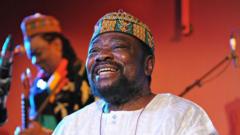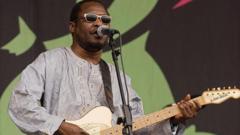Ghanaian music icon Teddy Osei, who founded the groundbreaking Afro-rock band Osibisa, has passed away at the age of 88 in London. His family confirmed the news on Tuesday, celebrating Osei as “an important voice in music and culture, who will be missed, but never forgotten.”
Born on December 1, 1937, in Kumasi, Ghana, Osei’s musical journey began under the guidance of his father, an enthusiastic musician involved in local school bands. Osei quickly developed a love for various instruments, especially the saxophone, a passion he nurtured during his studies in Sekondi. In the early 1960s, he moved to London on a government scholarship to pursue music and drama, where he established his first band, Cat's Paw. This group merged the distinctive highlife rhythms of West Africa with influences from rock and soul, setting the stage for future innovations.
In 1969, Osei co-founded Osibisa with fellow Ghanaian musicians Sol Amarfio and Mac Tontoh. Derived from the Fante word meaning "highlife," the band became a pioneer in blending traditional African music with rock, soul, jazz, and funk. These groundbreaking fusions helped place Osibisa on the international music stage, earning them widespread recognition and acclaim. Osei’s unparalleled creativity was instrumental in creating hit singles such as "Sunshine Day" and "Dance the Body Music," while their electrifying live shows enthralled audiences around the globe, including a notable performance at Zimbabwe's independence celebrations in 1980 alongside Bob Marley and the Wailers.
Osei's significant contributions to promoting African music internationally have left an enduring legacy in the music industry. In a 2021 interview with The Guardian, he reflected on his mission to positively impact the African music landscape and acknowledged his role in paving the way for major talents like Fela Kuti, the celebrated godfather of Afrobeat. He expressed pride in how Osibisa instilled confidence in African music, viewing it as one of his most profound achievements.
Although Teddy Osei's passing signifies the end of an era, his innovative spirit and the vast musical pathways he created for future African artists will continue to inspire generations to come, uniting audiences through the universal language of music.



















